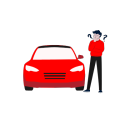Financing all Credit Types - 
Financing all Credit Types - 
Financing all Credit Types - 
Financing all Credit Types - 
Car noises can come from different parts and systems of your car, and figuring out the cause can be a bit tricky. But diagnosing the noise early on can help prevent more damage and save you from costly repairs later. We will discuss how to diagnose car noises and what they could mean.
Listen to the noise: When diagnosing a car noise, let's start by paying attention to where and when the noise occurs. Does it happen when you start the car, accelerate, or brake? Is it a ticking sound or more of a grinding noise? By identifying the type of noise and when it happens, we can narrow down the problem. For example, if you hear a clicking sound when turning, it could indicate an issue with the CV Axle.
Check the fluids: If you're still hearing that car noise, one simple and quick way to figure out what's going on is by checking the car's fluids. Low or dirty fluids can cause all sorts of noises. Just take a look at the engine oil, transmission fluid, power steering fluid, brake fluid, and coolant levels. If they're running low, just top them up and that might do the trick. And if the fluids are looking dirty, it's probably a good idea to get them changed.
Check the tires: If you hear any strange tire noises like whining or thumping sounds, it might be a sign of tire trouble. Take a look at the tire treads for any signs of wear and tear or uneven patterns. Don't forget to check the tire pressure too. Having properly inflated tires with good treads can help prevent those annoying tire noises. And if you do find a problem, the solution could be as easy as rotating the tires.
Check the exhaust: If the car makes a loud rumbling noise, the exhaust system could be the problem. The exhaust system is essential to reduce engine noise and harmful emissions. However, the exhaust system can corrode, rust, or develop leaks, leading to loud noises. Inspect the exhaust system for any visible damage or leaks and check for loose or broken hangers.
Check the brakes and rotors: Grinding noises during braking frequently indicate excessive wear of the brake pads, leading to metal backing plates making contact with the rotors. Such contact can result in damage to both the pads and rotors, necessitating prompt attention.
Consult a mechanic: If the car noise keeps on going after trying the above diagnoses, it's a good idea to reach out to a pro mechanic. They can figure out the issue accurately and quickly, before things get worse. Plus, they can suggest the repairs or replacements you need, saving you time and money.
Don't ignore those weird or loud car noises! They can cause more damage and cost a fortune to fix. By quickly figuring out what's causing the noise and getting it fixed, you can prevent further damage and keep your ride going strong. Now that you know how to diagnose car noises, make sure to stay on top of things and keep your vehicle in tip-top shape. Regular maintenance and tune-ups are key to preventing car noises and keeping your car running smoothly for years to come.





















